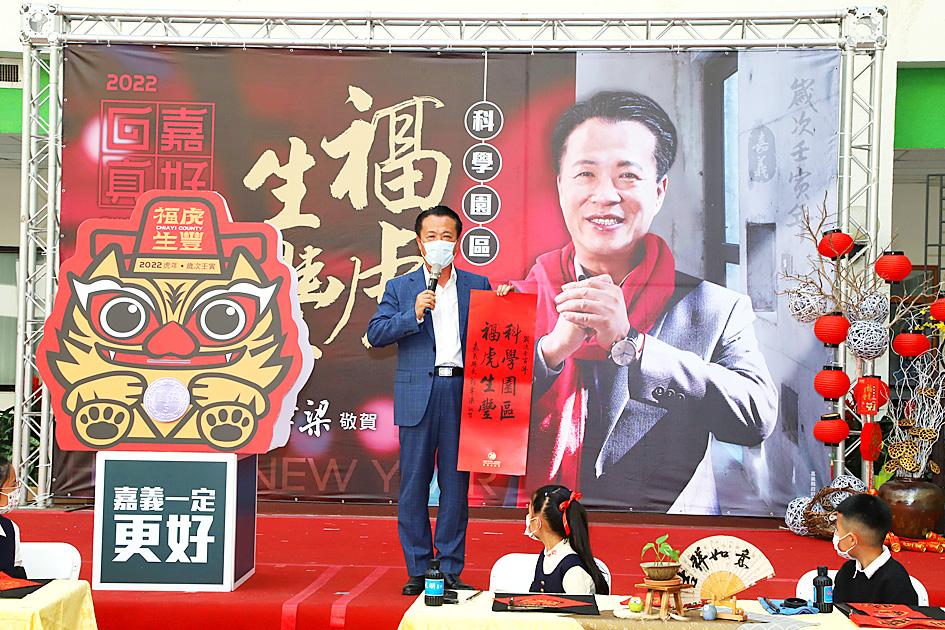Chiayi County Commissioner Weng Chang-liang (翁章梁) on Tuesday urged Taiwan Semiconductor Manufacturing Co (TSMC, 台積電) to choose his county after local media reported that it is the chipmaker’s preferred location to build an advanced IC packaging and testing plant.
The DigiTimes reported earlier in the day that TSMC was deciding whether to build the plant in Chiayi County or Yunlin County, with Weng’s county the more likely choice.
Weng said that he is delighted that TSMC is evaluating the possibility of building a plant in Chiayi.

Photo courtesy of the Chiayi County Government
The county government would do its best to help TSMC solve administrative problems arising from an investment project in Chiayi, he said.
Early this month, Premier Su Tseng-chang (蘇貞昌) approved a plan to allocate NT$8.5 billion (US$306.36 million) to set up a Chiayi science park in an 88 hectare site in Taibao City (太保) that was previously occupied by Taiwan Sugar Co (台糖).
Chiayi has a lot of land that is suitable for high-tech firms and good access to transportation systems, Weng said, adding that many firms have poured funds into the county, as they recognize its great growth potential.
With industrial parks in the county’s Machouhou (馬稠後), Shuishang (水上) and Chungpu (中埔) townships, and an aviation industrial park in Minhsiung Township (民雄), Chiayi has joined the growing list of tech areas in Taiwan, he said.
The Digitimes report cited industrial sources as saying that because TSMC’s customers have placed large orders for high-end IC packaging and testing services, the chipmaker is to build a new plant to meet the demand.
TSMC declined to comment on the Digitimes report.
TSMC operates four advanced IC packaging and testing plants — in Taoyuan, Hsinchu City, Taichung and Tainan.
The company is building a fifth IC packaging and testing plant in Miaoli County’s Jhunan Township (竹南), with phase one of the project to focus on 2.5D chip and system-on-IC technologies scheduled to start mass production this year.
Arisa Liu (劉佩真), an economist with the Taiwan Institute of Economic Research (台灣經濟研究院), said that the chipmaker aims to provide one-stop shopping services for customers from upstream pure-wafer foundry operations through backend IC packaging and testing.
This strategy is expected to help TSMC win more orders, in particular from major customers at a time when the chipmaker is aggressively expanding production capacity and upgrading technologies to cement its lead over competitors, Liu said.
TSMC had planned US$100 billion in capital expenditure from last year to next year.
Its spending was about US$30 billion last year, and it is to rise to US$40 billion to US$44 billion this year, it said last week.
Overseas, TSMC is building a wafer plant in Arizona using its 5-nanometer process technology, while it is expanding production of its mature 28-nanometer process in Nanjing, China.
The firm has also announced plans to team up with Sony Group Corp to build a wafer fab in Japan featuring the 22-nanometer and 28-nanometer processes.

Micron Memory Taiwan Co (台灣美光), a subsidiary of US memorychip maker Micron Technology Inc, has been granted a NT$4.7 billion (US$149.5 million) subsidy under the Ministry of Economic Affairs A+ Corporate Innovation and R&D Enhancement program, the ministry said yesterday. The US memorychip maker’s program aims to back the development of high-performance and high-bandwidth memory chips with a total budget of NT$11.75 billion, the ministry said. Aside from the government funding, Micron is to inject the remaining investment of NT$7.06 billion as the company applied to participate the government’s Global Innovation Partnership Program to deepen technology cooperation, a ministry official told the

Taiwan Semiconductor Manufacturing Co (TSMC, 台積電), the world’s leading advanced chipmaker, officially began volume production of its 2-nanometer chips in the fourth quarter of this year, according to a recent update on the company’s Web site. The low-key announcement confirms that TSMC, the go-to chipmaker for artificial intelligence (AI) hardware providers Nvidia Corp and iPhone maker Apple Inc, met its original roadmap for the next-generation technology. Production is currently centered at Fab 22 in Kaohsiung, utilizing the company’s first-generation nanosheet transistor technology. The new architecture achieves “full-node strides in performance and power consumption,” TSMC said. The company described the 2nm process as

POTENTIAL demand: Tesla’s chance of reclaiming its leadership in EVs seems uncertain, but breakthrough in full self-driving could help boost sales, an analyst said Chinese auto giant BYD Co (比亞迪) is poised to surpass Tesla Inc as the world’s biggest electric vehicle (EV) company in annual sales. The two groups are expected to soon publish their final figures for this year, and based on sales data so far this year, there is almost no chance the US company led by CEO Elon Musk would retain its leadership position. As of the end of last month, BYD, which also produces hybrid vehicles, had sold 2.07 million EVs. Tesla, for its part, had sold 1.22 million by the end of September. Tesla’s September figures included a one-time boost in

Shares in Taiwan closed at a new high yesterday, the first trading day of the new year, as contract chipmaker Taiwan Semiconductor Manufacturing Co (TSMC, 台積電) continued to break records amid an artificial intelligence (AI) boom, dealers said. The TAIEX closed up 386.21 points, or 1.33 percent, at 29,349.81, with turnover totaling NT$648.844 billion (US$20.65 billion). “Judging from a stronger Taiwan dollar against the US dollar, I think foreign institutional investors returned from the holidays and brought funds into the local market,” Concord Securities Co (康和證券) analyst Kerry Huang (黃志祺) said. “Foreign investors just rebuilt their positions with TSMC as their top target,